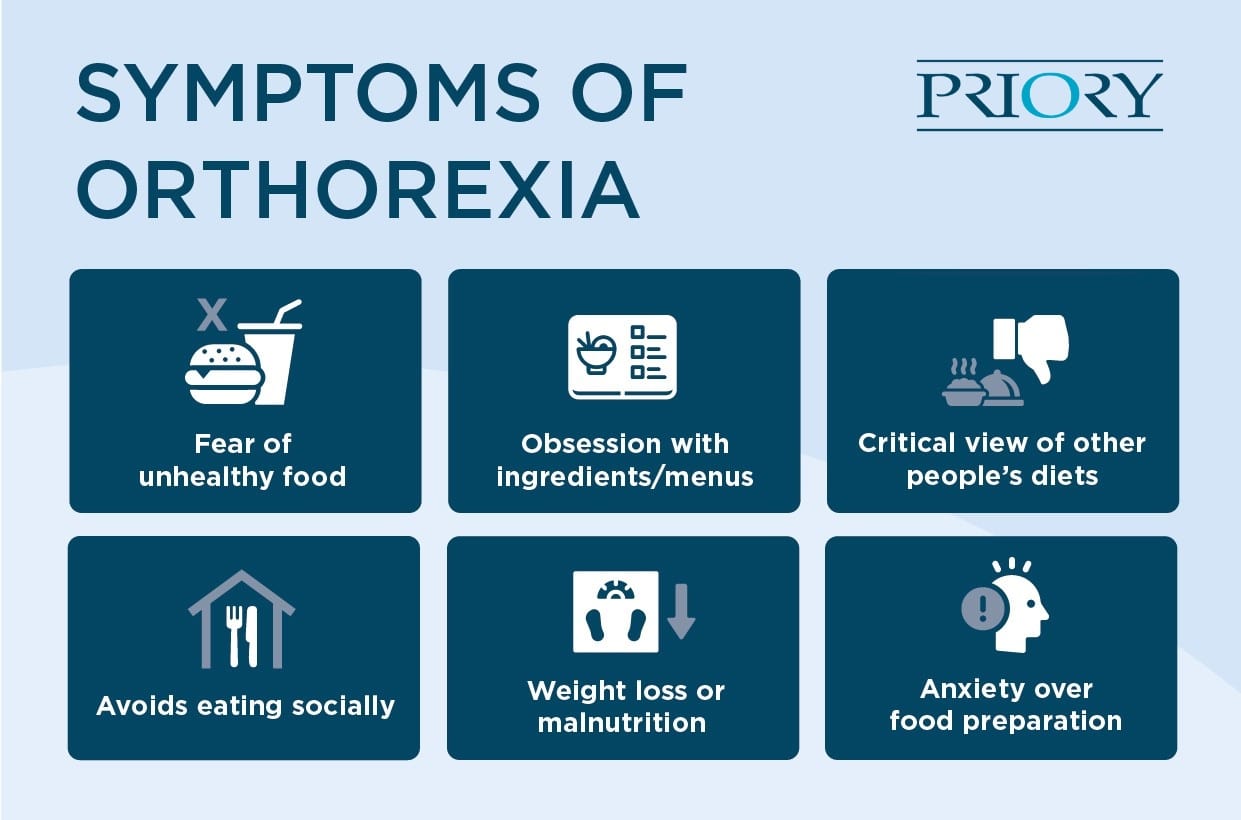Orthorexia: warning signs, causes and treatment
What you can do if you’re struggling with this eating disorder, defined by an obsession with healthy eating.
What you can do if you’re struggling with this eating disorder, defined by an obsession with healthy eating.



Healthy eating can bring many benefits to our lives, but for some, it can develop into an obsession. Orthorexia is an eating disorder that can have a lasting impact on your physical and mental health.
Our understanding of orthorexia is growing all the time. Read on to find out what orthorexia is, how it compares to other eating disorders, and what you can do if you think you might be struggling with it.
Orthorexia is a term coined in the late 90s by Dr Steven Bratman to refer to an intense fixation with healthy eating, focusing on the quality and purity of food. Although it’s not an officially recognised eating disorder, it’s a term that's becoming more prevalent, as the scrutiny upon healthy eating bloggers, crash dieting, and what is and isn't healthy intensifies.
While orthorexia remains unrecognised as a clinical diagnosis, its growth is thought to be linked to trends in society. The fixation on diet and healthy eating can sometimes cause an unhealthy obsession, leading to people putting their health at risk.
Join our expert therapist, Priory's Charlie Carroll, as he explains everything you need to know about orthorexia, from the symptoms to the potential causes.
People with orthorexia are fixated with the quality or ‘purity’ of food, obsessing over their perception of the 'cleanliness' of food and striving for what they consider to be a healthy diet. People with other common eating disorders, like anorexia nervosa, are usually more concerned with the quantity of food they're eating, and controlling their calorie intake.
People with orthorexia don't tend to be too concerned with their weight – although weight loss may be a symptom of their condition. However, achieving the ‘ideal’ weight will be a central issue for people struggling with anorexia nervosa.
Given its differences to other eating disorders like anorexia nervosa or bulimia nervosa, many believe orthorexia should be given its own diagnostic criteria, although many symptoms and signs may overlap.
There are several signs that may suggest someone is struggling with orthorexia. They include:

The tendency of people with orthorexia to become obsessed with their diet, and have a need for control, has led to this condition being compared with some types of anxiety disorder like obsessive compulsive disorder (OCD).
There's no known cause for orthorexia, but there are a few risk factors that could contribute to you developing the condition. There's some research into the social factors that may be at play. A review of psychological risk factors, published in the Appetite journal, suggested things like access to social media, access to healthy foods, and the level of nutritional knowledge can all contribute to developing orthorexia.
A study of students in the Eating and Weight Disorders journal, suggested that students studying health-related subjects, like nutrition or biology, may be more likely to show symptoms of orthorexia than people focused on other fields.
Given the overriding motivation behind orthorexia, the core idea driving someone’s condition might be a desire to:
Identifying orthorexia can be a challenge. People who have the condition believe that they're looking after their health. This can make it hard for them to accept there's a problem.
However, if it's left untreated, orthorexia can lead to serious problems with your health. Informed by how eating disorders are treated, here are some potential treatments for orthorexia.
If your orthorexia is linked to difficulties with severe anxiety or OCD, your treatment plan might look to harness techniques used in anxiety treatment. Examples include:
Many therapeutic techniques have been shown to be effective when treating eating disorders. Therapy looks to reverse the unhelpful thought processes and behaviours that fuel eating disorders like orthorexia. It will also help you develop coping strategies to deal with triggers and avoid relapses on a long-term basis.
Cognitive behavioural therapy (CBT) is one example, focusing on the thoughts and beliefs that underpin your eating disorder and seeking to change them. Therapy can take place on a one-to-one or group basis.
Working with expert dietitians, practical dietetic techniques aim to reintroduce you to a healthier, more sustainable diet that looks after you in the long-term. Examples of this include personalised meal support, weekly cooking and shopping classes and psychoeducational groups.
If you’re worried that you, or someone you know, might be struggling with orthorexia then reach out to your GP. They can assess your symptoms and offer a medically-informed opinion on what to do next.
Alternatively, you can reach out for private treatment here at Priory, where we support people struggling with eating disorders every day. Priory is home to Life Works, a leading provider of treatment for eating disorders in the UK. There, our team of expert therapists, psychiatrists, dietitians and nutritionists can help to put you on a path to long-term wellbeing.
